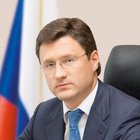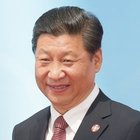Hadley Gamble: Mr President, thank you again for having us at the Russian Energy Week.
President of Russia Vladimir Putin: The same to you.
Hadley Gamble: Mr President, I want to ask you a little bit more specifically about your succession plans. Every good CEO has one. When you think about this with regard to Russia, do you really want to be president when you are 84 years old?
Vladimir Putin: No, I prefer not to answer questions of this kind. This is what I usually say in response. There is quite some time left before the next election, and discussing this topic has a destabilising effect. We need calm and stability so that all government agencies and structures work in all confidence, and do not worry about the future. It is true that under the Constitution I can do this, and run for another term, but there has been no decision to this effect so far.
Hadley Gamble: Mr President, I want to ask you specifically about the Middle East. You mentioned several times your relationship with Saudi Arabia, of course, via OPEC+. How do you see the region today? Are you worried about what is happening there with the departure of the United States?
See also
Vladimir Putin: I think that the Middle East is a very promising region of the world. What I currently see both in the United Arab Emirates and in Saudi Arabia is that the leaders of these countries are proactive in their efforts to diversify their economies. They are thinking about the future, and I am certain that they will achieve results because they are steadfast in their commitment.
As for our efforts to stabilise the global energy market, it is true that we have debates that can get quite heated, and each of us defends their positions, but in the end, we always arrive at balanced decisions that are acceptable to all the sides, at least this has been the case so far. Our partners, despite the fact that they are leaders in oil production and sales, are still making plans on green energy. At first glance, this may seem strange, but this is what is really happening. We are discussing with them opportunities for investing heavily in new technologies and energy sources. I think that this is a very promising sphere for future cooperation.
Hadley Gamble: So, Mr Novak, a few months ago, suggested that we were going to see oil contracts denominated in something other than US dollars. Possibly, in crypto. When do you think that we will see that happen?
Vladimir Putin: Contracts in crypto? This seems premature. Of course, cryptocurrency can be used in settlements, but it is very unstable. It is fine for transferring funds from one place to another, but I think it would be premature to use it in trading, especially when dealing with energy resources. So far cryptocurrency has lacked any backing. It is legitimate and can be used in settlements, no doubt about that, but it is too early to use it for trading in oil or other raw materials and energy sources.
However, things change, and everything has the right to exist. We will see how this will go from here. Maybe crypto will one day be used to store value. But we see how the market fluctuates, so it seems too early for that now.
Hadley Gamble: Does that mean, though, in your view with regards to crypto, people like Elon Musk, the value of what they hold is worthless?
Vladimir Putin: This is not what I said. Of course, there is value there. However, can it be used in settlements when buying and selling oil? This is what I am talking about.
In order to mine crypto, you need a lot of energy, and for that people have to use traditional sources of energy, primarily hydrocarbons.
Hadley Gamble: I know via your Central Bank Governor, our conversation this summer, she essentially said to me that you are moving away from US dollar-denominated assets when it comes to trying to diversify away from the US dollar. Is that so sanctions have less of a bite to the Russian economy?
Vladimir Putin: I think that the United States is making a big mistake when it uses dollars as a sanctions tool. This is what they are actually doing because they make it impossible to pay for products under sanctions with US dollars. Our clients simply cannot pay us in dollars for the products we deliver to them. What happens next? We have no choice other than to switch to other currencies in our settlements. This is the first point I wanted to make.
The second is, when other countries that rely on the dollar as their reserve currency or in settlements see what is going on, they start worrying that the dollar may be used against them in a similar fashion. They also start scaling down their dollar assets and do not use the dollar in their settlements as actively as they used to. As a result, even the closest US partners and allies are reducing the share of the dollar in their reserves, which is a statistical fact.
Of course, we are doing this, by reducing the share of the US dollar in our reserves, as well as in settlements. This is not always possible, but we try to switch to national currencies. In this regard we can say that the United States is cutting the branch it is sitting on, because the status of an international reserve currency is a major competitive advantage, but through their actions they are undermining it, undermining their strategic economic interests for the sake of momentary political gain.
Hadley Gamble: Do you see the US dollar devolving into a currency that is not the world’s reserve currency? Do you believe that could happen?
Vladimir Putin: It is undermining its standing as a global reserve currency. The volume of dollar-denominated settlements is declining, and countries are scaling down their dollar reserves. That said, we are not interested in giving up on dollar settlements altogether. So far, we were quite satisfied with using dollars in settlements for energy resources, primarily oil. However, if the US authorities persist in their policy as I have described it, we will have no other choice. The US will have undermined confidence in the dollar by its own actions.
Besides, the US sovereign debt is growing. Congress has once again increased the sovereign debt ceiling. What does this mean? Money printing. What would be the result? Higher inflation. This is probably the first time inflation in the United States is growing at a speed that has not been seen for quite a while. These are economic reasons that undermine confidence in a currency. Everyone is asking themselves: what next? What will the US economic authorities do with this huge debt? What will they do? Manipulate the dollar and depreciate its value? What will they do with the debt?
These are, of course, fundamental issues, and they do not have anything to do with us. It is up to the Federal Reserve and the US Administration with its economic policy. The United States is the world’s biggest economy, a high-technology one, setting the tone for the global economy in its entirety, and it is our objective interest to avoid any turmoil and major fluctuations, but this does not depend on us.
We are keeping a close eye on these developments, analysing them and taking the necessary steps to ensure our long-term interests.
Hadley Gamble: A question for you on China. President Xi says you are his best friend. Does it concern you what you are seeing from the United States with regards to the AUKUS agreement? Do you think that that is heightening tension with China creating the potential for a new Cold War?
Vladimir Putin: I also believe that President Xi Jinping is my friend. We have worked together for many years and have achieved good results on both the political and economic tracks. I believe that this benefits the people of China and Russia, and gives more balance and a sense of stability in international affairs.
Creating blocks like the one you have mentioned, formed by the United States, Great Britain and Australia, undermines regional stability. I believe that being friends with someone is a good thing, but being friends against someone is bad. This undermines the stability we have been discussing and that matters so much to us.
What has happened has happened, but I do hope that the situation will not follow some unpredictable scenario and would not create additional tension in the region.
Hadley Gamble: Before we let you go: in terms of your greatest concerns, you mentioned inflation; we now have a prospect of stagflation. We talked about AUKUS, we talked about tension in the South China Sea, and what has happened in Afghanistan. Now we have the gas crisis. A cornucopia of issues facing the world. What is your greatest concern today?
Vladimir Putin: Our greatest concern and the main task is to increase people’s incomes. This is our priority, our number one task, and we are not going to resolve it by simple linear methods. To do this, we must ensure the growth of the economy and a change of its infrastructure. This is a long-term goal. We are not going to use populist methods. It is based on qualitative economic growth that we intend to resolve major social tasks, including an increase in the incomes of the Russian people and the demographic problem, which is our second most important task. It implies a package of social issues: healthcare, education and support for families with children. To resolve all these tasks, we have mapped out certain national development goals. This is a big issue. Therefore, we should resolve the two main problems ‒ improve demography and increase people’s incomes, raise their quality of life on this serious economic foundation I have just mentioned.
This is what we are going to do in the near future.
Hadley Gamble: What about Mr Navalny? Are you interested in improving his quality of life?
Vladimir Putin: The person you mentioned is in a detention facility.
Hadley Gamble: Not great quality of life.
Vladimir Putin: Not the best conditions on earth but he is not alone. Apart from him, other people have also violated Russian laws. We are not going to put anyone in some exclusive conditions, including those that are covering up their dealings with political activities.
I think this answers your question.
Hadley Gamble: Mr President, thank you.
Vladimir Putin: Thank you.

